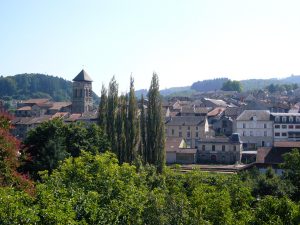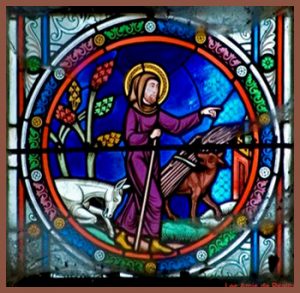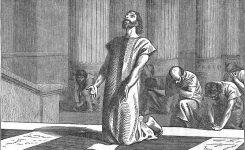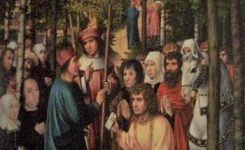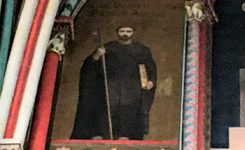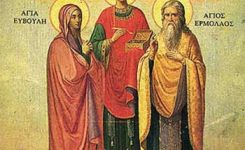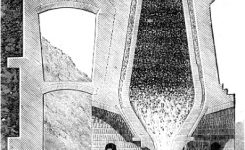prayer liturgical
Saint Psalmodus of Limousin
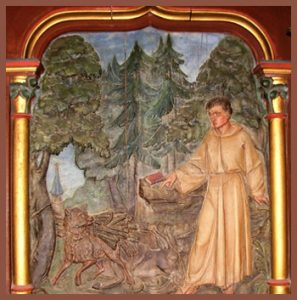
Painting of St Psalmodus and a wolf. Credit: Friends of Psalmet – Parish of Sainte Anne des Monts et Rivières
The Venerable Anchorite Saint Psalmodus of Limousin
(Saint Psalmode du Limousin) (589)
Feast Day: March 8/21 (Orthodox Commemoration) (June 13 in Eymoutiers & Limoges; June 14 by monks of Ramsgate; in other places: August 6; November 24; October 6)
On 8 March, the memory of our venerable father, the holy Irish anchorite Psalmodus or Saumon, disciple of Saint Brendan of Clonfert, who lived as a hermit near Eymoutiers in Limousin, where he domesticated the wolves.
Verses:
Psalmodus the Irishman, hermit in Limousin,
showed himself a sociable neighbor for the wolves.
He deserved an ode for his sweet patience,
the Limousian hermit who was called Psalmodus.
On the eighth day of March, we celebrate the exodus of him to heaven.
Also known as Psalmet or Saumay, his given name is unknown to us, however, because of his constant psalmodizing for God, reciting the entire Psalter from memory daily, he earned this nickname.
This saint was most likely born in Ireland, although he could stem from Scotland.
Gaufredus of the Abbey of Saint Martial in Limoges wrote the life of Psalmodius. This account says that in 630, as a young man, he left his fatherland, family and friends and went with Saint Brendan on a boat to the mainland. The boat entered France through the Charente estuary, and the two Saints went to Bishop Leontius, the bishop of Saintes, to ask his blessing.
Psalmodius became a student of the bishop, who ultimately advised him, reading the Saint’s heart and seeing the numerous miracles he worked earn him a reputation for holiness and prevent him from living a life of solitude, to take up the eremitical life of contemplation. Heeding this advice, he took up residence in a small cell in the thick forest of Grigeas (Grie), nearby the present site of the abbey of Eymoutiers in Western France. But even in this remote area, people found him and flocked to receive his prayers and healings.
He was known to be of great sanctity, with power over demons. He tamed wild beasts, emulating Saints Gerasimos of the Jordan who had a lion which carried water from the river for the Saint; Saint Harvey, hermit of Brittany, who placed a halter on a wolf and made him plow his field successfully; and Saint Romedius of the Val di Nòn in Northern Italy who tamed a bear. When a wolf had killed Psalmodus’ donkey, by his meekness he tamed the wolf to become his new useful companion, carrying bundles of firewood.
In the akolouthia of the Saint, we learn that Psalmodus did not have “an articulate tongue”, but God blessed him to be able to continuously recite from memory psalms, canticles and inspired hymns as he lived in harmony with nature. The hymnody constantly reflects his charism with animals:
Ode 1 of the Canon of Matins:
“…living in peace with nature…”
Ode 5:
“Ardently, all thy life, for the name of the Most high God, O Psalmodus, thou didst psalmodize as the young David, who played with the wolf as if he was a lamb.”
Ode 6:
“One was astounded to see thee helped, O Psalmodus, in thy domestic labors by a wolf whom thy meekness had tamed, anticipating the messianic harmony.”
The Kontakion:
“…thou hast re-established the harmony which existed before the transgression in Paradise…”
Ode 8:
“Oracle of the Prophet Esaias: The panther shall do no harm to the kid, the lion shall eat the grass as an ox, the nursling shall play in the den of the asp, the young child shall put his hand into the hole of the viper, for the land shall be filled with the knowledge of God just as the waters cover the bottom of the sea.”
“David was thy model, O holy father, for thou didst learn from this young shepherd to play with the ferocious wolf as if he were a lamb, with the terrible lion as if he were a kid…”
Because of this command over beasts, “By his prayers, he instantaneously cured the daughter of the duke of Gascony, who had been bitten by a poisonous viper” and was ready to die as doctors could not help her. (A Biographical Dictionary of the Saints, 1924, The Rt. Rev. F.G. Holweck, p. 837). In another incident, a shepherd, while asleep, had a small snake crawl into his mouth, but Saint Psalmodus made the sign of the cross over the man and the snake who was torturing him came out.
When Psalmodus reposed, he was buried by the Vienne River, at the “foot of the hill”, or “ayen-moutiers” in French, from whence comes the name “Eymoutiers”. Pilgrims to his tomb received healing from “holy fire” (ergotism), blindness, and children with bowel or heart problems received relief and healing. He is also invoked for women to have a good delivery and for relief of the torments of the dying.
Troparion
1st tone
As a hermit, O Psalmodus, by thy presence alone thou has sanctified Limousin, showing the example of continual psalmody in honor of thy Master Christ; do thou, who exultest before his throne together with the anchorites and holy monks, ceaselessly implore Him on behalf of our souls.
Kontakion
3rd tone
By thy virtues and thy natural qualities, O Psalmodus, thou hast re-established the harmony which existed before the transgression in Paradise between the first men and the animals of the forest, for they saw that thou also wast in the service of the same Master and Pantocratic Creator.
The Canon of the holy hermit Psalmodus of Limousin bears the acrostic, in the original French text:
En l’honneur de Psalmode psalmodie Denis.
In honor of Psalmodus, Denis psalmodizes.
Translated by Schema-Archimandrite John (Lewis) +2007
From the French Akolouthia composed in 2001 by Hieromonk Denis (Guillaume) +2008, in Supplément au Ménée de MARS and published in Самиздат, September 2001, pages 155-160
Synaxaria augmented by Mother Andrea
Image credits:
St Psalmodus with Wolf and Stained Glass image:
Friends of Psalmet – Parish of Sainte Anne des Monts et Rivières.

